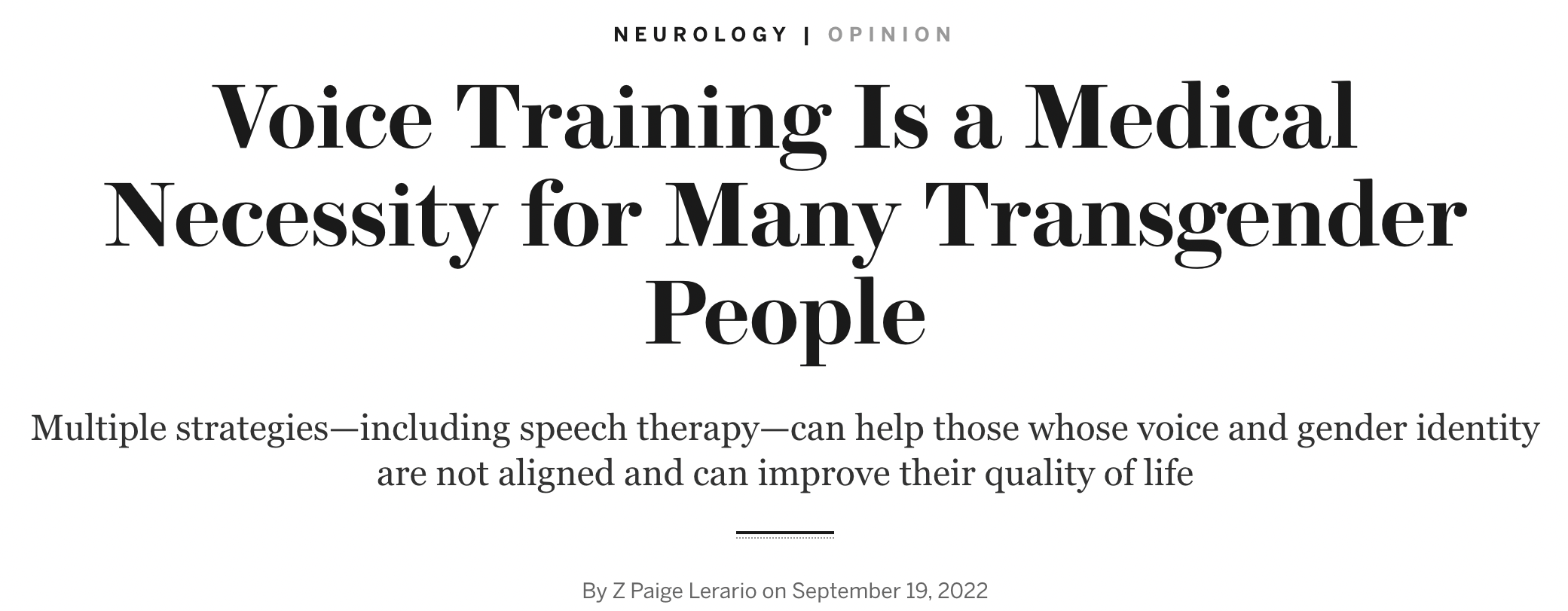
https://blogs.neurology.org/ideas/voice-training-is-a-medical-necessity-for-many-transgender-people/
Published January 9, 2023 in Neurology Blogs,
By Z Paige L’Erario, MD
I am very proud of mine and my colleagues’ work published in September in Scientific American: Mind Matters.1 This represents a career accomplishment for any medical professional, transgender or otherwise.
Bridges to other disciplines –such as speech-language pathology– are imperative for neurologists to build in order to ensure our future success in an increasingly diverse world and workforce. Since the number who hold multiple, intersecting, oppressed identities2 is small within neurology, those from historically oppressed communities may need to reach outside the profession to establish connections to mentorship, collaborators, and career opportunities. Further, multidisciplinary,3 coordinated care is good practice ,4 regardless of our identities.
I hope this work provides helpful reasoning to create affirming clinical and research systems of care for transgender and gender diverse people.
Click here to read the full Scientific American article.
References:
- ZP Lerario. Voice Training Is a Medical Necessity for Many Transgender People. Scientific American: Mind Matters. Published September 19, 2022. https://www.scientificamerican.com/article/voice-training-is-a-medical-necessity-for-many-transgender-people/
- S Saleem, S Naveed, AMD Chaudhary, et al. Racial and gender disparities in neurology. Postgrad Med J 2021;97(1153):716–722. DOI: 10.1136/postgradmedj-2020-138584
- SW Pedersen, M Suedmeyer, LWC Liu, et al. The role and structure of the multidisciplinary team in the management of advanced Parkinson’s disease with a focus on the use of levodopa–carbidopa intestinal gel. J Multidiscip Healthc 2017;10:13–27. DOI: 10.2147/JMDH.S111369
- JC Foo, V Jawin, TY Yap, et al. Conduct of neuro-oncology multidisciplinary team meetings and closing the “gaps” in the clinical management of childhood central nervous system tumors in a middle-income country. Childs Nerv Syst 2021;37(5):1573-1580. DOI: 10.1007/s00381-021-05080-4
Voice Training Is a Medical Necessity for Many Transgender People
By Z Paige Lerario on
Calling customer service is a situation we all know and dread. We navigate a maze of automated voice commands, hoping to speak with a real live person. For some that live connection is a relief—but not for everyone.
Within seconds the customer service agent uses cues from someone’s voice—pitch, for instance—to decide to describe the caller as “sir” or “ma’am.” For many who are transgender, that language is distressing when they are identified by the wrong gender pronoun or title. When we do not affirm a transgender person’s identity, that person’s risk for anxiety, depression and suicide can increase.
I am an openly transgender neurologist and activist. My research and that of others in this field point to two key ways we can support transgender people whose voice and gender identity do not align. First, small changes in language can help cisgender people (those whose gender aligns to traditional male and female categories assigned at birth) be more sensitive and accurate in the words they use. Second, gender-affirming voice treatments can be effective medical care, giving transgender people a valuable tool to express their identity to the outside world.
Many people perceive specific vocal traits as either masculine or feminine. For example, high pitch and vocal resonance from the face and mouth are often linked to a feminine identity. Low pitch and resonance from the throat and chest seem masculine. And different brain areas appear to process the voices of masculine versus feminine speakers. When people are unsure about a speaker’s gender—as when experimenters manipulate audio to produce ambiguous voices—listeners show distinct brain activity as well.
Often a person’s perceptions of voice and gender reflect long-standing beliefs learned over many years through social and cultural upbringing. For example, because many have been taught that gender is only male or female, their ability to describe voices that are more gender-ambiguous is limited. Nonbinary individuals are more likely to correctly identify speakers with such voices.
But this history, and the associations in the brain, does not mean these judgments are unchangeable. Learned behaviors can be unlearned or relearned. For example, my colleagues and I published a study looking at how language influences gender perception when hearing someone’s voice for the first time. We recorded 24 transgender and cisgender people repeating a range of short words. Then 105 people of diverse genders from across the U.S. listened to these recordings and rated the gender of the speaker along one of several different scales. We found that the terms used in each scale could influence how listeners rated the gender of a speaker’s voice. A scale that included binary “male” and “female” options led to more extreme results, rating speakers at one end or the other. But more graded “masculine” versus “feminine” scales led to rankings closer to the center, which allowed for individuals with an ambiguous or intermediate gender to be better represented. So a relatively small change in language could help reduce the odds of misgendering others.
More directly, voice therapies, both nonsurgical and surgical, can help a transgender person change their vocal characteristics, aligning them with their gender identity. Voice training is less costly and invasive than a throat operation, making it a more common starting point. Through sessions with a licensed speech-language pathologist, transgender people learn to control pitch, resonance, word choice and other vocal behaviors. Studies have found that most transgender people who undergo this training are satisfied with their results. Such training can improve quality of life, reduce voice-related disability and boost self-confidence.
Despite its benefits, many public and private health-care insurers in the U.S. do not cover voice training for transgender people. With several U.S. states now trying to ban gender-affirming health care for transgender adolescents, the situation will likely get worse. Many in the transgender community pursue self-training, without professional supervision. This increases their risk of learning unhealthy speech patterns that can damage vocal tissue.
We should recognize voice training and gender-affirming surgeries as medical necessities, which should be covered by insurance. Like puberty blockers and gender-affirming hormones, these interventions save lives.
